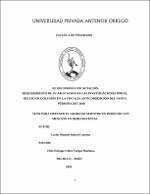| dc.contributor.advisor | Chira Vargas Machuca, Félix Enrique | |
| dc.contributor.author | Roncal Cancino, Carlos Manuel | |
| dc.creator | Roncal Cancino, Carlos Manuel | |
| dc.date.accessioned | 2020-12-16T11:43:16Z | |
| dc.date.available | 2020-12-16T11:43:16Z | |
| dc.date.issued | 2020 | |
| dc.identifier.uri | https://hdl.handle.net/20.500.12759/6938 | |
| dc.description.abstract | La presente investigación de maestría se realiza con el propósito de obtener el grado de
Maestro en derecho penal, y se orienta a determinar la manera en que se viene requiriendo la
aplicación de las medidas de decomiso e incautación en las investigaciones por el delito de
colusión a nivel del Distrito Fiscal del Santa.
El contexto típico en que se desarrolla el delito de colusión, la contratación estatal, es
un ámbito en que existe gran disposición de dinero por parte del Estado destinado a la
satisfacción de finalidades públicas. El dinero que rodea a la contratación pública constituye
un gran aliciente para la comisión de este delito. Los que intervienen en su comisión esperan
obtener la mayor cantidad de réditos económicos, lo que podría explicar por qué la colusión
es un tipo penal de recurrente comisión en la administración pública.
La obtención de beneficios patrimoniales, a través del delito colusión, es un factor que
no podemos dejar de tener en cuenta, ya que es el móvil que guía al agente para la comisión
del mismo, por lo que el ordenamiento jurídico debe de brindar una respuesta jurídica frente
a dicha situación.
El decomiso constituye una herramienta eficaz de lucha contra la delincuencia que se
mueve esencialmente por el afán de lucro (la colusión lo es); va a impedir en efecto, que estos
puedan utilizarse para financiar otras actividades ilícitas y establecer la existencia de
patrimonios criminales, denotando un mensaje que el delito no resulta provechoso.
El decomiso es una consecuencia jurídica orientada a privar al agente del producto del
delito, por lo que cualquier provecho económico que se obtenga a partir de aquel será privado
y trasladado al dominio del Estado.
Para la aplicación del decomiso el Ministerio Público cumple una función
preponderante, ya que será dicho órgano quien durante la investigación llevará a cabo todas
las acciones tendientes a identificar y asegurar los bienes que serán materia de decomiso y
una vez finalizada la investigación requerirá al Juez la aplicación de esta medida, quien
finalmente decidirá si es viable o no su imposición | es_PE |
| dc.description.abstract | This master's degree investigation is carried out with the purpose of obtaining a
Master's degree in criminal law, and is aimed at determining the way in which the application
of confiscation and seizure measures has been required in investigations for the crime of
collusion at the level of the Fiscal District of Santa.
The typical context in which the crime of collusion takes place, state contracting, is an
area in which there is a large availability of money by the State for the satisfaction of public
purposes. The large amount of money surrounding public procurement constitutes a great
incentive for the commission of this crime. Those who intervene in its commission hope to
obtain the greatest amount of economic revenue at the expense of crime, which could explain
why collusion is a criminal type of recurring commission in the public administration.
Obtaining capital benefits through collusion crime is a factor that we cannot fail to take
into account, since it is the motive that guides the agent to commit it, so the legal system
must provide a legal response against to that situation.
Confiscation is an effective tool to fight crime, which is essentially driven by profit
motives (collusion is); it is going to prevent, in fact, that these can be used to finance other
illegal activities and establish the existence of criminal assets, denoting a message that the
crime is not profitable.
Confiscation is a legal consequence aimed at depriving the agent of the proceeds of
crime, so any economic benefit obtained from it will be private and transferred to the domain
of the State.
For the application of the confiscation, the Public Ministry fulfills a preponderant
function, since it will be said body, who during the investigation will carry out all the actions
aimed at identifying and securing the assets that will be the subject of confiscation and once
the investigation is completed will require the Judge to application of this measure, who will
finally decide whether or not its imposition is feasible. | en_US |
| dc.description.uri | Tesis | es_PE |
| dc.format | application/pdf | es_PE |
| dc.language.iso | spa | es_PE |
| dc.publisher | Universidad Privada Antenor Orrego | es_PE |
| dc.relation.ispartofseries | T_MAEST.DERE_132 | |
| dc.rights | info:eu-repo/semantics/openAccess | es_PE |
| dc.rights.uri | https://creativecommons.org/licenses/by/4.0/ | es_PE |
| dc.source | Universidad Privada Antenor Orrego | es_PE |
| dc.source | Repositorio Institucional - UPAO | es_PE |
| dc.subject | Colusión | es_PE |
| dc.subject | Decomiso | es_PE |
| dc.title | El decomiso e incautación. Requerimiento de su aplicación en las investigaciones por el delito de colusión en la Fiscalía Anticorrupción del Santa periodo 2017 - 2018 | es_PE |
| dc.type | info:eu-repo/semantics/bachelorThesis | es_PE |
| thesis.degree.level | Maestría | es_PE |
| thesis.degree.grantor | Universidad Privada Antenor Orrego. Escuela de Postgrado | es_PE |
| thesis.degree.name | Maestro en Derecho con Mención en Derecho Penal | es_PE |
| thesis.degree.discipline | Maestría en Derecho | es_PE |
| dc.subject.ocde | https://purl.org/pe-repo/ocde/ford#5.05.02 | es_PE |
| renati.type | https://purl.org/pe-repo/renati/type#tesis | es_PE |
| renati.level | https://purl.org/pe-repo/renati/level#maestro | es_PE |
| renati.discipline | 421357 | es_PE |
| dc.publisher.country | PE | es_PE |


